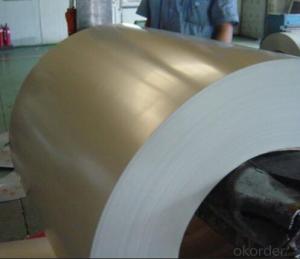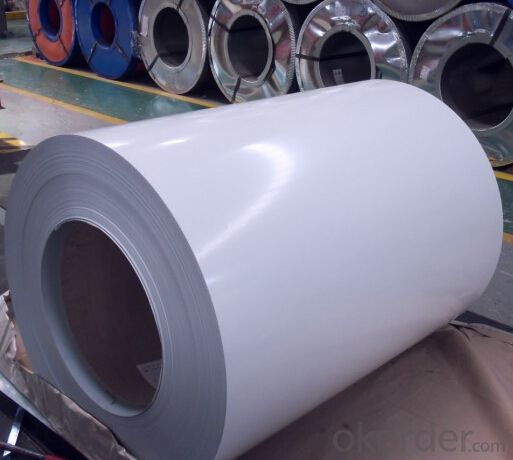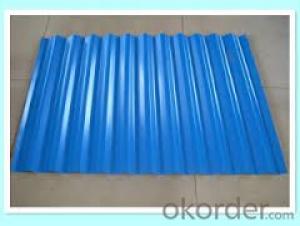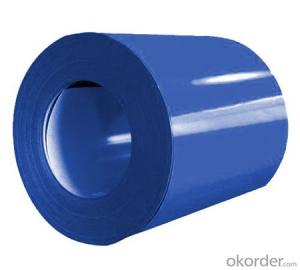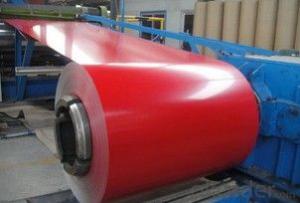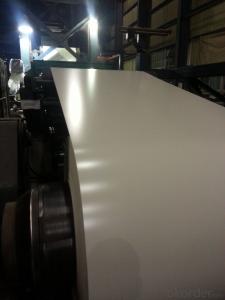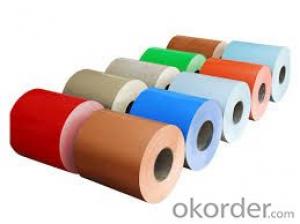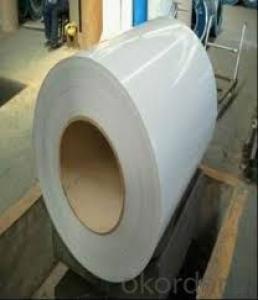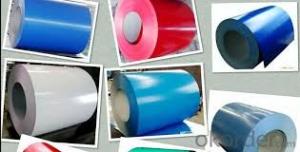Pre-painted Galvanized Steel Coil/Color Coated SGCC SPCC
- Loading Port:
- Tianjin
- Payment Terms:
- TT OR LC
- Min Order Qty:
- 10 m.t.
- Supply Capability:
- 1000 m.t./month
OKorder Service Pledge
OKorder Financial Service
You Might Also Like
Specification
1.Introduction of Prepainted Galvanized Steel Coil:
Now, PPGI/PPGL has been widely applied to many kind of buildings. More and more contractor earn their reputation by using our products. You can see PPGI/ PPGL is extensively applied to shopping mall, industrial/agricultural building, hotel, restaurant, resort, office building or gymnastic facility. Our products help contactors to get their job done quickly and conveniently.
2.Usages of Prepainted Galvanized Steel Coil:
With excellent cold bending molded manufacturability, good decoration effect, strong anti-corrosion ability, galvanized steel coils and sheets are also pollution-free and easily recycled. Accordingly, they can be used as final products and basic plates of color coated steel coils and widely applied in construction, home appliances, decoration, ect.
3.Prepainted Galvanized Steel Images:
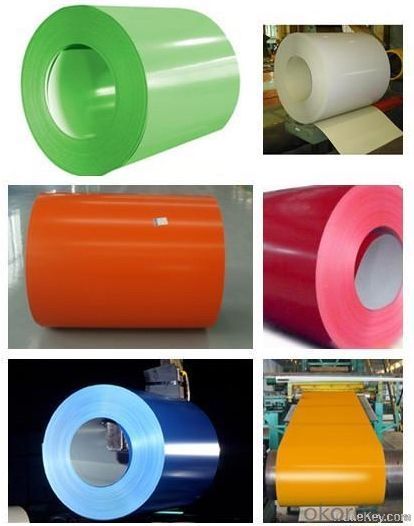
4.Galvanized Steel Specification:
| Raw material | SGCC, SPCC, DX51D, G300,G550,A653 |
| Certificate | ISO9001.ISO14001.OHSAS18001 |
| Thickness | 0.15mm-1.5mm |
| Width | 1500mm or under |
| Tolerance | thickness+/-0.01mm |
| Surface treatment | galvanized / aluzinc steel sheets |
T Bending (top-coating) T Bending (back-coating) | ≤3T ≤3T |
| Anti-MEK Wiping | ≥100times |
| Zinc coating | 40-275g |
| Type of coating structure | 2/1 or 2/2 coating, or customized |
| Standard | JIS G3312-2005,EN10169-2006,ASTM A653, GB/T12754-2006, GB/T9761-1988, GB/T9754-1988, GB/T6739-1996, HG/T3830-2006, HG/T3830-2006, GB/T1732-93, GB/T9286-1998, GB/T1771-1991, GB/T14522-93 |
| Color | ACCORDING TO CUSTOMER'S SAMPLES OR RAL COLOR NO. |
| Application | Building industry ,structural use, roofing, commercial use ,household appliance,industry facilities,office buildings |
5.Our Factory:
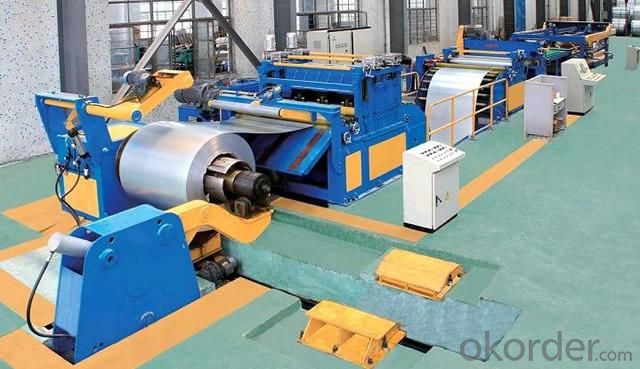
6.FAQ
We have organized several common questions for our clients,may help you sincerely:
①How about your Warranty?
Warranty: 1-Year for the whole light. Warranty is based on correct storage, installation, using and maintenanc
②How to guarantee the quality of the products?
We have established the international advanced quality management system,every link from raw material to final product we have strict quality test;We resolutely put an end to unqualified products flowing into the market. At the same time, we will provide necessary follow-up service assurance.
③How long can we receive the product after purchase?
In the purchase of product within three working days, We will arrange the factory delivery as soon as possible. The pecific time of receiving is related to the state and position of customers.Commonly 7 to 10 working days can be served.
- Q: Can steel coils be painted?
- Yes, steel coils can be painted. Painting steel coils not only enhances their aesthetic appearance but also provides a protective coating against corrosion and other environmental factors. The coils are typically pre-treated and primed before the application of paint to ensure proper adhesion and durability.
- Q: how come when i put steel legs in lowest price in grand exchange no one buys them i got 101 steel legs in there and there at lowest price and they have been there for 3 days
- Steel legs are popular smithing items. Maybe a lot of persons are selling them at lowest price too so yours don't get sold. Plus, no one really buys steel legs.
- Q: What is galvanized steel coil?
- Galvanized steel coil is a type of steel that has been coated with a layer of zinc to protect it from corrosion. The process of galvanization involves immersing the steel coil in a bath of molten zinc, which forms a protective layer on the surface of the steel. This layer not only prevents corrosion but also provides a barrier against scratches and other damage. Galvanized steel coil is commonly used in various industries, including construction, automotive, and manufacturing, due to its durability and resistance to rust. It is often used for making roofing materials, pipes, and automotive parts, among other applications. Overall, galvanized steel coil is a versatile and cost-effective solution for ensuring the longevity and integrity of steel products.
- Q: How are steel coils different from steel sheets?
- Steel coils and steel sheets are both made from the same material, which is steel. However, they differ in terms of their shape and size. Steel coils are long, continuous rolls of steel, usually wound up in a coil form, while steel sheets are flat, rectangular pieces of steel. The main difference lies in their applications - steel coils are commonly used in industries where large quantities of steel are required for manufacturing processes, such as automotive or construction, whereas steel sheets are often used for smaller-scale projects or as a raw material for further processing.
- Q: How are steel coils used in the production of heating and cooling systems?
- Steel coils are used in the production of heating and cooling systems as they serve as the primary component for heat transfer. These coils are typically made from high-quality steel and are designed to efficiently transfer heat between the system's refrigerant and the surrounding air. By passing the refrigerant through these coils, the heat is either absorbed or released, depending on whether the system is providing heating or cooling. This process enables the heating and cooling system to effectively regulate the temperature of a space, providing comfort and maintaining desired conditions.
- Q: What are the common thicknesses available for steel coils?
- The common thicknesses available for steel coils vary depending on the specific application, but they typically range from 0.5mm to 25mm.
- Q: How are steel coils used in the production of automotive suspension systems?
- Steel coils are used in the production of automotive suspension systems as they provide the necessary support and flexibility to absorb shocks and vibrations. These coils are typically used in the construction of coil springs, which are then integrated into the suspension system to ensure a smooth and comfortable ride for the vehicle.
- Q: What are the common methods of handling steel coils during production?
- During production, steel coils can be handled using a variety of methods. These methods have been developed to guarantee the secure movement and storage of the coils, as well as to streamline the processing. 1. Forklifts: Within a production facility, forklifts are frequently employed to transport steel coils. Equipped with specialized attachments like coil rams or coil hooks, forklifts securely grip the coils, making transportation effortless. They are especially useful for moving coils over short distances or between different areas of the production floor. 2. Overhead cranes: Another commonly used method for handling steel coils is through the use of overhead cranes. These cranes are usually fixed on rails and can span the entire length of the production facility. By utilizing lifting devices such as C-hooks or magnets, overhead cranes can securely lift and transport the coils. They are particularly beneficial for moving large or heavy coils over longer distances. 3. Coil cars: Coil cars are specialized vehicles mounted on rails, specifically designed to transport steel coils within a production facility or between different areas of a steel mill. These cars are equipped with adjustable arms or forks that can be positioned to securely hold the coils. Coil cars are often utilized when there is a need to move large quantities of coils simultaneously. 4. Coil racks: To store steel coils in a vertical position, coil racks are employed. Constructed from heavy-duty steel, these racks are designed to securely hold multiple coils. They are commonly found in warehouses or storage yards, maximizing space while allowing easy access to the coils. 5. Coil trailers: For long-distance transportation of steel coils, specially designed trailers known as coil trailers are used. These trailers incorporate built-in coil cradles or bunks that securely hold the coils during transit. They often feature adjustable or removable coil racks to accommodate different sizes or configurations of coils. In summary, various specialized equipment such as forklifts, overhead cranes, coil cars, coil racks, and coil trailers are commonly used to handle steel coils during production. These methods prioritize worker safety and coil integrity while promoting efficient movement and storage throughout the production process.
- Q: Can steel coils be coated with barcodes?
- Yes, steel coils can be coated with barcodes.
- Q: Is it possible to make a homemade blacksmith forge from a washing machine drum made of stainless steel?
- If you build it properly, it will work. That drum is a little small though. I once made a forge from a wheel barrow with a brake drum fire pot and used it for a couple of years.
Send your message to us
Pre-painted Galvanized Steel Coil/Color Coated SGCC SPCC
- Loading Port:
- Tianjin
- Payment Terms:
- TT OR LC
- Min Order Qty:
- 10 m.t.
- Supply Capability:
- 1000 m.t./month
OKorder Service Pledge
OKorder Financial Service
Similar products
Hot products
Hot Searches
Related keywords
